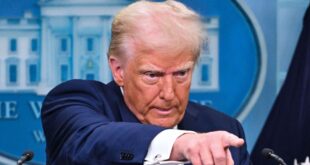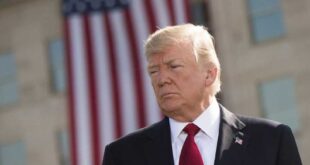Mohammed Ayoob
The Chinese culpability in the global spread of the coronavirus, which is now a proven fact, has provided the United States the opportunity to put China in the dock in the hope that it would substantially erode the prestige and soft power that China has accumulated within the international community over the past decade.
While the containment of the coronavirus is nowhere in sight it has become evident that this unprecedented global health crisis has become embroiled in the strategic competition between the United States and China. This was most clearly depicted in the war of words that has broken out between the United States and China about the culpability of the latter for the worldwide spread of the deadly virus. President Donald Trump fired the first salvo by repeatedly referring to the coronavirus as the “Chinese virus.” Although he later promised to forego that epithet, his Secretary of State Mike Pompeo stepped into the void by insisting at the recent virtual meeting of the G-7 that the virus be characterized as the “Wuhan virus.” His insistence that the term was to be used in the joint statement normally issued after such a conclave resulted in the cancellation of the statement.
Other nations rejected the term as being unnecessarily divisive at a time when international cooperation is essential to combat the coronavirus. However, Pompeo insisted that it was important to point out that the virus came from the Chinese city and that China’s government failed in its duty to warn the world about its dangers. Similarly, a UN Security Council statement on the coronavirus pandemic was stalled by American insistence that China be singled out as its country of origin.
The Chinese have hit back at the United States by indirectly accusing it through obvious government-encouraged posts on the social media of being responsible for the manufacture and spread of the virus. Conspiracy theories originating from China have implied that U.S. government agencies were testing the virus as a biological weapon for use in times of war.
The World Health Organization (WHO), the international watchdog for global health issues, has also become enmeshed in this controversy. Trump has accused WHO, especially Director-General Dr. Tedros Adhanom Ghebreyesus, of initially minimizing the coronavirus outbreak and then siding with China by praising its response. Trump has threatened WHO that he would cut off American funding for the organization because of its “China-centric” approach to the pandemic.
Trump’s accusation, and he is not alone in making this criticism, is based on the fact that initially, Tedros underplayed the global threat posed by the virus thus protecting China from blame for not having publicly acknowledged the imminent threat of the disease and the possibility of its global spread. This is borne out to some degree by the fact that he said in a statement issued on January 23, when the virus was raging in Wuhan and spreading to other parts of China, declaredthat “China has taken measures it believes appropriate to contain the spread of coronavirus in Wuhan and other cities. We hope that they will be both effective and short in their duration. For the moment, WHO does not recommend any broader restrictions on travel or trade.”
This statement clearly implied that it was safe to travel to China and to permit Chinese nationals to travel abroad at a time when infections and deaths were multiplying and when it was the duty of WHO to warn the global community of dangers of unrestricted travel to and from China. Some critics have extrapolated from the failure of the WHO to pin blame on China for the virus and, specifically, for its inaction in reporting it quickly that the organization was trying to shield Beijing from blame because it was a major contributor to WHO’s budget at a time when the United States and Europe had been trimming down their contributions.
The argument about the culpability of China’s autocratic regime gained additional strength with the revelation that eight Chinese doctors who acted as whistleblowers regarding the virus were summarily discredited by the Chinese government as rumor mongers. Unfortunately, one of the eight doctors, Li Wenliang, succumbed to the disease soon after Beijing’s effort to discredit him and his colleagues for their efforts to put the world on notice.
However, the U.S. tactic of public name-calling of China on this issue is based not only on altruistic considerations but is also motivated by strategic and political reasons. Washington is especially worried that its inability to control the virus and find antidotes to it could not only lead to loss of face but also in the long run irretrievably erode its position as the preeminent global power with the capacity to set the international security and economic agendas. Several American commentators have made clear that the United States’ failure to act quickly and lead the world in finding a solution to the crisis could, in the long run, result in a reversal in the global pecking order with the United States losing its preeminent position to China.
Explicitly putting the blame on China in international forums for its duplicity and complicity in spreading the global pandemic could do much to undercut China’s global standing and protect America’s position in the international pecking order. During the past decade, the United States has been apprehensive of China’s growing military power as well as of its soft power through the Belt and Road Initiative and through loans extended to various developing countries in Asia and Africa on concessionary terms. This has added dramatically to the extension of China’s global reach and to its prestige among members of the international community at a time when Trump’s “America First” policy has clearly signaled Washington’s desire to retrench from its global commitments. The Trump administration’s unwillingness to take the lead internationally to combat the coronavirus threat is a major example of such retrenchment as is its decision to withdraw from Afghanistan and other hotspots in the Middle East. This dynamic of Chinese expansion and American retrenchment has over the past few years emboldened Beijing to repeatedly defy the United States on trade and other economic issues. It has also encouraged China to openly engage in activities in the Asia-Pacific region that the United States considers deleterious to its strategic interests.
The Chinese culpability in the global spread of the coronavirus, which is now a proven fact, has provided the United States the opportunity to put China in the dock in the hope that it would substantially erode the prestige and soft power that China has accumulated within the international community over the past decade. Washington seems to be optimistic that if this happens, then it would make China more amenable to American pressure on a whole range of economic and strategic issues and consolidate America’s standing as the lone superpower, a position that was increasingly being challenged by China.
Mohammed Ayoob is University Distinguished Professor Emeritus of International Relations, Michigan State University, and a senior fellow for the Center for Global Policy. His books include The Many Faces of Political Islamand, most recently, Will the Middle East Implodeand editor of Assessing the War on Terror.
Image: Reuters
 Geostrategic Media Political Commentary, Analysis, Security, Defense
Geostrategic Media Political Commentary, Analysis, Security, Defense





